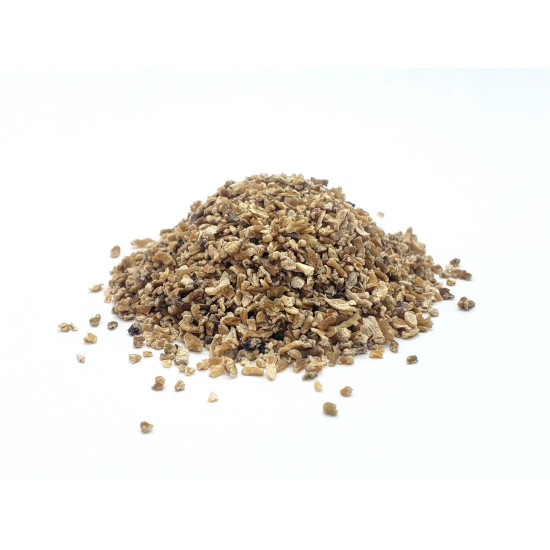Protafloc Granules - 20kg

Please login with a MICROBREWERY ACCOUNT to see microbrewery prices.
If you don't have a MICROBREWERY ACCOUNT, please register using the guidelines below.
Protafloc Granules - 20kg
An easy-to-use granule form of semi-refined grade carrageenan kettle finings that is suitable for worst, although not suitable for use in a whirlpool. Carrageenan is derived from certain types of seaweed and is a sulphated polysaccharide which complexes with undesirable protein fractions. These carrageenan products are usually added towards the end of the boil and aid in wort clarification.
Description
Protafloc Granules(E407) are a semi-refined grade carrageenan product added to the kettle's wort to enhance protein removal as the wort cools.
Benefits
- Brilliant wort clarity - Protafloc is optimised for removing haze-sensitive proteins from wort. It achieves clarity by precipitating virtually all haze material from cold worts and giving extensive cold break formation.
- Reduced costs of beer processing - Protafloc reduces costs by removing fine proteinaceous particles, simplifying downstream fining, filtration and beer stabilisation
- Energy savings from reduced boil times - Protafloc will maintain performance even with reduced boil times
- Consistent beer fining - Protafloc can clean up worts with variable particle content presenting a more consistent beer for racking
- Prolonged beer shelf-life - Protafloc removes substantial qualities of proteinaceous haze-precursor material without affecting head retention.
Principle
The active ingredient in Protafloc is a polysaccharide called carrageenan, derived from seaweed. Carrageenan in solution is negatively charged owing to the sulphate groups along the polysaccharide backbone. It is these charged sites which interact with wort proteins.
The carrageenan has a random coil structure in solution at temperatures above 65°C. As the wort cools, the carrageenan takes a much more compact and ordered helical structure, which is thought to drag the protein particles together to form aggregates. The aggregates, having a larger particle radius, settle faster. Kettle finings are added in the kettle only to allow the carrageenan to dissolve. Wort proteins react with carrageenan as the wort cools and settle as a cold break during fermentation to be removed along with the excess yeast.
The removal of particles and protein from wort has been demonstrated by microscopic examination of pre-filtered beers and protein assay. As the levels of kettle finings increase, the fine particle counts decrease. It should be noted that the particles below two microns are mostly responsible for blinding filter pores. Since Kettle Finings remove both particulate and soluble protein, and soluble protein is a
component of chill haze, it is unsurprising that the colloidal stability of kettle fined beers
is enhanced.
Guidelines for use
- Check that the product is within its shelf life before use
- Ensure that the product is dispersed into the wort and does not stick to the walls of the kettle or be drawn up the stack with the steam
- Carry out optimisation trials to determine the correct rate of use
- Read the Safety Data Sheet before use
- DO NOT open the kettle to make the addition unless the boil has been temporarily turned off
- DO NOT add the product significantly earlier or later than the recommended time
Application and rates of use
If this is not possible, Protafloc Granules should be added to the kettle ten minutes before the end of the boil or to the whirlpool. This allows the powder to dissolve and disperse the carrageenan into the wort. Should Protafloc be added early in the boil, then polymer degradation may occur, and product efficiency is lost. The reaction between wort proteins and carrageenan is pH dependent and occurs at an optimum pH of 5.3. Below pH 4.4, the reaction does not occur, and little benefit is gained from using Kettle findings. Kettle finings optimisation procedure
The exact rate for a given wort will vary according to the brewery, the recipe and the types of malt and adjuncts used. Typical rates vary from 0.75g to 4.8g per hl, but a kettle finings optimisation should be done to determine this more accurately. Use rates should be checked when you change suppliers or move to new seasons of malt. When the dose rate increases, the clarity improves, but the level of sediment increases. Overfining will give rise to beer losses in the fermentation vessel. The optimisation procedure is as follows:
- Make up a solution of kettle finings by dissolving 1g of carrageenan product in a litre of boiling water. (This gives a 0.1% solution)
- Label seven 100 ml measuring cylinders in 5 ppm increments, including a 0ppmcontrol up to 30ppm
- Add a range of finings rates to the 100ml measuring cylinders using a 10ml pipette (0.5 ml of kettle finings solution = 5ppm).
- Take a wort sample (approx. 2L) 15 minutes before the end of the boil and just before the addition of kettle findings.
- Fill the measuring cylinders with 100ml of hot wort.
- Record the wort clarity and appearance of the hot break.
- Cool by immersion in cold water in the bucket for 20 minutes.
- Allow to settle for 2 – 4 hrs and observe the appearance of the cold break, recording the wort clarity and cold break volume.
- Allow to stand for a full 24 hours to get a final result.
Delivery from Get Er Brewed
Your order will be dispatched from our warehouse and delivered by your choice of courier service that we provide.
Please click on the link below for more information on the available delivery services.
DELIVERY INFO
Once your order has been packed and is ready for delivery, our team will inform you of the dispatch date and the delivery reference number.
Weight Limits:
The weight limit is 30kg for DPD and 70kg for DHL, either by volumetric or actual, whichever is greater. (Remember, a large packing box weighs 1kg of that total weight).
For products or orders over these weights, the PALLET SHIPPING option is available.
We
try our utmost to package professionally and keep your items as safe as
possible. If your parcel arrives damaged, please ensure you sign for it
as received damaged and send us a brief description of what has happened
and a few pictures so we can provide the courier with feedback to
resolve.
For any more information, please contact us at 0800 2289 433 or send an email to [email protected].













